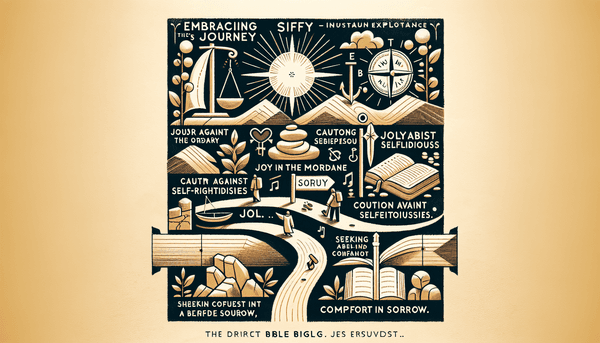Finding Joy in Life's Simple Pleasures
In the book of Ecclesiastes, the Teacher imparts a message that resonates through the ages: \"Go, eat your food with gladness, and drink your wine with a joyful heart, for God has already approved what you do. Always be clothed in white, and always anoint your head with oil. Enjoy life with your wife, whom you love, all the days of this meaningless life that God has given you under the sun—all your meaningless days. For this is your lot in life and in your toilsome labor under the sun.\" (Ecclesiastes 9:7-9). This passage encourages us to relish the simple, everyday joys—the food we eat, the love we share, and the work we do. It acknowledges life’s fleeting nature, reminding us to cherish each moment and the relationships we hold dear, just as we are reminded to 'Rejoice in the Lord always' (Philippians 4:4) and to remember that 'This is the day that the Lord has made; let us rejoice and be glad in it' (Psalm 118:24).
The Limitations of Human Wisdom
Ecclesiastes 7:16 offers a humbling reflection: \"When I applied my mind to know wisdom and to observe the labor that is done on earth—people getting no sleep day or night— then I saw all that God has done. No one can comprehend what goes on under the sun. Despite all their efforts to search it out, no one can discover its meaning. Even if the wise claim they know, they cannot really comprehend it.\" This verse reminds us that our quest for wisdom and understanding, while noble, has its limitations. The mysteries of God's creation are vast and often beyond our grasp, as echoed in Isaiah 55:8-9, where God's thoughts and ways are said to be higher than ours. It calls us to embrace humility, to trust in the Lord with all our heart, and not to lean on our own understanding (Proverbs 3:5-6), for even the wisdom of the wise is foolishness to God (1 Corinthians 1:25).
Avoiding the Pitfalls of Overrighteousness
The wisdom from Ecclesiastes continues with a caution against self-righteousness: \"Do not be overrighteous, neither be overwise— why destroy yourself?\" (Ecclesiastes 7:16). This intriguing admonition warns against the dangers of excessive piety and intellectual arrogance, akin to the concerns addressed in another discussion on finding solace in scripture, emphasizing the need for balance and humility. It reminds us that, as followers of Christ, we are called to 'act justly and to love mercy and to walk humbly with your God' (Micah 6:8) and to consider others better than ourselves (Philippians 2:3), seeking a righteousness that is not self-serving but is borne of a genuine love for God and others.
Finding Comfort in Times of Heartbreak
Heartbreak is an all too common human experience, but the Psalms offer comfort: \"The Lord is close to the brokenhearted and saves those who are crushed in spirit.\" (Psalm 34:18). In moments of grief and sorrow, we can find solace in the presence of God, who offers healing and restoration to our weary souls. He is the source of all comfort, who comforts us in all our troubles (2 Corinthians 1:3-4). As we navigate through our darkest times, we can find strength in the knowledge that God is with us, that Jesus offers rest for the weary (Matthew 11:28-30), and that there is hope for a future where every tear will be wiped away (Revelation 21:4).
FAQ
Q: What does Ecclesiastes 9:7-9 mean?
A: This passage from Ecclesiastes encourages us to find joy in the simple pleasures of life and to enjoy the blessings that God has given us. It speaks to the importance of finding contentment and happiness in the midst of life's challenges and uncertainties, and to cherish the relationships with those we love. It's a reminder that God wants us to experience joy and fulfillment in our lives, even as we navigate the difficulties of this world.
Q: What does Ecclesiastes 7:16 mean?
A: This verse from Ecclesiastes 7:16 is a reflection on the limitations of human understanding and wisdom. It acknowledges that despite our efforts to seek knowledge and understanding, there are aspects of life and the world that are beyond our comprehension. It reminds us that there are mysteries and complexities that we may never fully grasp, and that even the wisest among us cannot claim to have complete understanding of all things. It encourages humility and a recognition of the vastness of God's creation and the limitations of human knowledge.
Q: What does \"Do not be overrighteous, neither be overwise—why destroy yourself?\" mean?
A: This phrase comes from Ecclesiastes 7:16 and it's a cautionary reminder about the dangers of self-righteousness and overconfidence in one's own wisdom. It's a warning against becoming so focused on being morally upright or intellectually superior that one becomes judgmental, prideful, or isolated from others. The verse encourages balance and humility, reminding us that excessive self-righteousness and wisdom can lead to harm and self-destruction. It's a call to seek wisdom and righteousness with a spirit of humility and compassion, recognizing our own limitations and the need for grace and understanding toward others.
Q: What does Philippians 4:6 mean?
A: Philippians 4:6 advises us not to be overwhelmed by anxiety but to approach God with our worries and requests through prayer and thanksgiving. It is a reminder to trust in God's provision and care, and to seek peace through a relationship with Him, rather than being consumed by concerns about how we are perceived by others. This verse encourages us to focus on our identity in Christ and find our worth in His acceptance and love.






